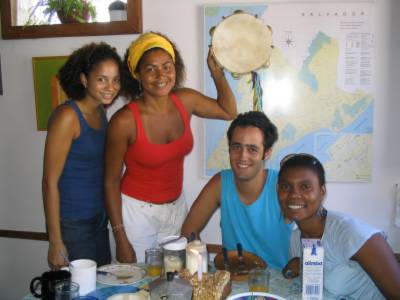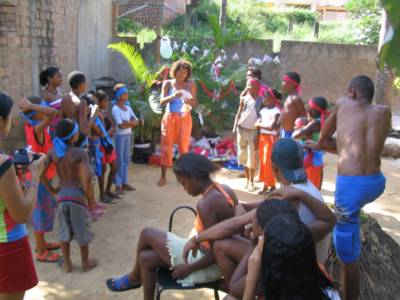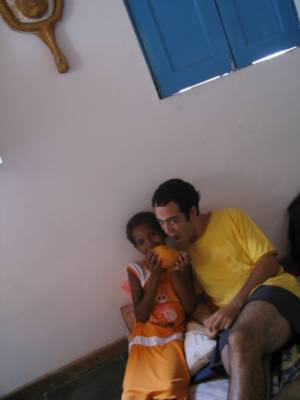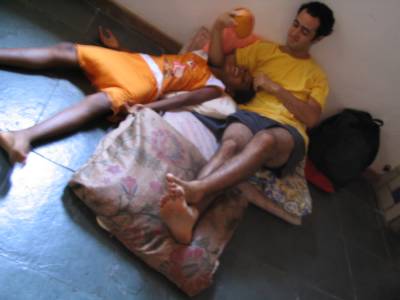Friday, December 31, 2004
happy new year (and happy birthday to me...)
This morning I woke up and stumbled out to find the table laid out for guests and a big breakfast on top. I asked Márcia if guests were coming. She said yeah, her mom and some relatives. Which reminded her, could I clean my room since it was messy and her mom was coming? I said sure and cleaned the room. Then my friend Mariamma showed up unexpectedly. We had talked earlier about doing a thing with her photos on my computer, but the table was in use now and since we had guests coming it was going to be difficult to work on it, and I didn't know if we had enough food, so I tried to do it quick so I could get her out of there. Then my friends Mariel and Michelle showed up and, dense as I am, it still took me like 10 seconds to realize that Márcia's mom wasn't coming, that it was all lies, that the table was for a surprise party for me. I must say I almost started crying. It was so nice and thoughtful. I think that all anyone ever really wants on their birthday, or at least all I ever want, is to feel special and cared about, and a surprise party does that. Especially important when one is far from home. I instantly forgave Márcia for all her apparent callousness, knowing that this had been brewing the whole time.
So happy new year everybody. Thanks for reading. I'm about to go out. Salvador has a tradition where the color you wear on new year's signifies what you want from the new year: white is peace, yellow is prosperity, etc. I, like most people, am wearing white.

surprise birthday brunch: mariel, márcia, me, and michelle (mariamma taking picture). a festival of the m's.

márcia gave me birthday flowers: the pink and yellow flowers represent the two orixá who will rule the coming year, and the white and red flowers are those orixá's favorite flowers
natal
Christmas was pretty awesome. There was a big barbeque and dogs and chickens running everywhere. Márcia planning and executed a wide variety of children's games, to the delight of all. It's pretty clear that she's all the kids' favorite aunt/cousin/etc. I've tried to post a video of one of the games in which each kid had a balloon tied to his or her ankle, and had to stomp the other kids' balloons without getting stomped. It was real fun, but I don't think I posted it right. Will try again later. After that we all drank beer and soda and danced arroxa, which is a sort of sexual popular dance here. At everyone's urging, I danced with a bunch of Márcia's 18-year-old nieces.
Also, and this post is quickly turning into an homage to Márcia, I don't think I've ever met somebody who embodies the "spirit of Christmas" quite like she does. After staying up making gift bags for the myriad kids who were coming to the party, we made a whole nother batch to give to children in the street because "they see the kids who get gifts and they have nothing, so it makes a big difference if you give them something." She worked really hard for Christmas, both for her own family and for strangers. It was good to see.
Thursday, December 30, 2004
so the lousy news...
As I've mentioned before, the whole reason I am in Brazil is to study microfinance. The plan was to volunteer/use my grant money to work at a nice microfinance NGO, all the while learning about how it worked and learning Portuguese. Sounds good, eh? And I even found a nice place: Planet Finance. My old Harvard pal Raz Tsien heads up their China division, and she got me in touch with the nice-seeming and very enthusiastic Frederico Celentano, who runs their Brazilian operation. I sent Frederico a long letter stating my situation, and he was extremely encouraging, saying we should "talk by phone" so that he could "present our projects" to me. He thought we could "work together" and wanted to know if I could "come to São Paulo" soon. Call me crazy, but I read these as signals that he wanted to work with me.
I was satisfied and turned to other matters (the Roland paper and my applications) while occasionally lobbing a call or email his way. He was traveling a lot according to his secretaries, so I didn't think much of the fact I wasn't connecting with him. But then a month passed, and still I hadn't heard. It was getting increasingly difficult to explain away his non-response with busyness or carelessness, and I began to get worried. Finally I launched an all-out telephone and email assult, determined to bring this miscreant to justice. I guess realizing I wasn't going to go away, he finally responded, saying he's been really busy and he never meant to imply blah blah blah... Long story short, I don't have a job there. What a weasel. It's all well and good if you don't want a volunteer like me, but I don't understand why someone would act so enthusiastic and then change so abruptly, and take so long informing me of the change. At least I figured out he's an unreliable asshole now rather than after I've done something rash like move to a new city to work for his organization. I'm not actually despairing because I'm confident I can find something else, but now I need to actually do it, which will be a challenge. I wish it could have been as easy as it seemed. And I'm pissed I've lost all this time.
Wednesday, December 29, 2004
queer brasil
My main source of information on gayness in Brazil is my roommate Márcia, who is herself gay as a meadowlark in spring. (She just ended an eight year relationship with a woman named Lisa. In her words she was casada (married).) According to Márcia, there are still many people in Brazil who think gayness is wrong. There also many people, especially men, who engage in gay sex without considering themselves gay. (This reminds me of that excellent article "Double Lives on the Down Low" that appeared in the NYT Magazine about a year ago.) But just walking the streets, it seems clear that the level of acceptance of homosexuality in this country is far above most places in the world, and on par with some of the more tolerant parts of the United States. It's a little like Japan. I've been to concerts where men kissed openly in the audience, and certainly seen my fair share of gay-oriented TV. One of the most popular talk shows in São Paulo is hosted by a gay man named Clodóvil. And I've been to a lot of parties, via Márcia, with gay men who emulate the limp-wristed American archetype. All in all, it seems that if you're going to be gay and Latin American, Brazil is the place to be. Why is this true? Damned if I know. But in general, Brazil is sex crazed. It seems to have avoided the Catholic guilt the rest of the continent suffers. Perhaps sex-positivity leads to sex-difference-acceptance...?
You should be warned I've switched to beer. They've got some large 600ml bottles here. Hey, gotta celebrate.
i'm back!
Tuesday, December 28, 2004
tsunami relief donations on amazon
Also, if you want to see video of waves hitting...
Friday, December 24, 2004
merry christmas...
Love,
Alex
Thursday, December 23, 2004
i'm starting to like kids more
Tuesday, December 21, 2004
candomblé
We took a taxi out to one of the more distant neighborhoods and stopped in front of an unassuming house. It was maybe 9 o'clock. A man and a woman came out of the house to ask if we were here for the service. We said we were. They then asked Deborah, one of our party, to remove her blouse. It was black, which was bad luck. We found her another blouse and went inside.
The main area consisted of two small room with most of the wall knocked out between. In one sat the observers, and in the other were three drummers and a singer, all male, and about 10 old women dancing in a circle. It was clear they had really taken the white thing to heart. Nearly everything was done in white: the plaster walls, the cloths draped over tables and lights, the dirty unclipped poodle that ran to and fro the entire night, and the dresses of the women. The men would play a song and the women would dance, slowly, using small motions that at times seemed to mimic rowing. Then the song would end abruptly and there would be silence, the women pacing for a minute, one or two sitting down, or a sitting woman joining the circle, until the music started up again. Women kept coming and going the whole night. The silence was particularly silent, coming after so much noise and movement and with so little warning.
The division between the rooms was only approximate. People in the observing room would sometimes clap or sing, while people in the participating room would sometimes sit and watch. And people went back and forth all the time.
About halfway through the night, the dance circle ended and a new pattern began: the solo trance-like dance. One woman at a time would do it, dancing in the standard way. Then sometimes her body would go rigid and she'd let out chirps or squeals. There was one woman I particularly liked a lot. Unlike most of the women she was skinny, and had glasses. She looked a great deal like a librarian, which in fact she may have been. Or to be more precise she looked like Ruth Bader Ginsburg. But to see her dancing like that -- it was an interesting juxtaposition of person and context.
I think that as an outsider there's a tendency to see people who do something like this as really different. But she was in some way so familiar, it was impossible to watch her without imagining her stamping your books. To go to this place felt like traveling back in time, but that's a false impression. These are real people, doing this in 2004, and they have otherwise modern lives. In fact Márcia, to the extent that she is religious, is an adherent of Candomblé. She has her Orixá (syncronistic equivalent of patron saint). She will not place her purse on the floor for fear of inviting financial calamity. Throughout the service she kept getting people to uncross their arms and legs, because that is considered bad luck. In a hundred little ways these traditions inform her life. And she is anything if not modern.
I also began to think about how many religions, even those most familiar to me, have sects who do something quite close to this. Christians have the Pentacostals. Jews have the Hasidim (by now that tradition is quite far removed from ecstatic worship, but orginally that was its claim to fame). Muslims have the Sufi dervishes. And so on. It seems to be some very basic and common thing to worship in this way.
Toward the end a very old woman came out with a large container filled with acarajé, a mealy bean-based loaf reminiscent of falafel, and an oversized crown. People from the observation room began to filter in to bow to her and take a piece of acarajé. I did this along with the crowd. Then people came out of a back room with large plates of food -- rice, chicken, acarajé, cururú -- and gave everyone a plate. Then the service was done, and we all ate together.
Later on I was talking to the old woman who had given me the acarajé, and somehow she decided she wanted me to guess her age. I figured she was about 85, but following the dictum that you should always lie when asked that question, I shaded down and guessed 65. Boy am I glad I did. She was 67.
I don't have any deep conclusions to reach. Thinking back to my days in ethnomusicology class, I know they would have a field day. For me it was more about being allowed to peek into a very different world which I didn't understand at all, and then find threads that led back to things I maybe do understand. Also, it was very beautiful with the music and the dancing and all the white cloth.
P.S. One last academic-y thing. I was reading an article about Candomblé that made a big deal about how the Christian saints merged identities with existing Yoruba gods and godesses, and that this made the adoption of Christianity (or at least aspects of it) more palatable to people accustomed to polytheism. But then, unrelatedly, I was reading the chapter on early Christianity in The History of the Decline and Fall of the Roman Empire (I know, I'm a dork) and Gibbon argues that saints were originally employed to serve this very purpose. He says that the earliest Christianity didn't have saints, but they were employed from the 4th century or so onward as a means of easing the conversion of polytheists. So if this is true, saints were not co-opted by Candomblé -- they were serving their original purpose.
Sunday, December 19, 2004
revenge of the nerd discussion
Now, to recap, the article that I was responding to argued that nerds are nerdy because they choose to be -- because they value smarts over popularity. I disagreed, arguing a) that most nerds do in fact desire popularity, and b) that nerds aren't actually smarter than non-nerds, they are just worse at hiding the intelligence they do have.
Jamie writes:
I think Jamie's right that there will always be social divisions in schools, and that some kids will be ostracized no matter how hard they try to avoid it. And that it isn't simply being hip to social cues -- it's looks, sports ability, wealth, luck, and a host of other things outside a person's control. However, I still think social adeptness will always top that list. And I will also point out that this comment reinforces argument (a), that nerds usually don't want to be nerds and use all their wits to find a way out. They just aren't always successful.I don't think it's fair to blame the fact that kids are unpopular or get picked on at school because "they just can't pick up on social cues". I spent most of middle school and the bulk of high school tormented by the fact that I didn't have any close friends, and the "friends" I did have mostly made fun of me because I sucked at pretty much all the things we did together: video games, basketball, tormenting those slightly less popular than us. I was surpressing my intelligence and eccentricities, desperately trying to figure the angles and was still getting nowhere... even if you had a whole middle school of eccentricity suppressing social cue Sherlock's it would still break down into in-groups, out-groups, and free floating kids who sit alone at the end of the lunch table.
Liz Speck writes:
I'd just like to point out that you hardly get an accurate cross-section of the
popularity castes from Exeter and Harvard. I think you're right to a certain
extent, but my public high school experience was wildly different from my
experience at Exeter. There most definitely was a stigma attached to
intelligence, unless you were letting those terrible bitches copy off your
grammar test. Grrrrr.
Again, I agree but I don't think this contradicts what I've said. First, I was basing my "personal experience" section on my three years at Dover Junior High, not on Exeter and Harvard, which I recognize are effete, dork-celebrating institutions. Second, my point wasn't that intelligence isn't stigmatized. It is, greatly. It's just that I think some smart kids do a good cover job (and get popular) while others are less successful (and get pantsed). And that the kids who do a bad job aren't any smarter than the kids who do a better job. They're probably more cued in socially, but maybe too they've got some countervaling positive (like being good at sports) that makes people more forgiving towards them, or else maybe they're just lucky.
While thinking about all this I suddenly realized that I was supposed to be an economist, and that I had at my disposal a large dataset (90,000 students) with lots of information and test scores and friendship and stuff. So here's what I did: I constructed a rough measure of popularity. Every student was asked to list their 10 best friends, so for each student I counted the number of people who had listed them. This varied from 0 (many people had no one list them) to a max of 37 for what must be one wicked cool kid. Then I saw how this popularity measure was related to grades and test scores. The results were surprising.
And increase of 1 on the popularity scale (an additional person listing you) was associated with a half letter-grade rise in GPA. And lest you think this is some weird affect of people behaving differently in class, where people can observe each other, it is also associated with a third of a standard deviation rise in standardized test scores, which presumably are private information. So the data suggests rather strongly that, contrary to common wisdom, popular kids are actually smarter than nerds, or at least do better in school. One caveat: this says nothing about casuality. We can't say that good grades lead to popularity or vice versa, only that people with more of one tend to have more of the other.
I confess to being surprised by this. At most I thought I'd find no correlation. Could common wisdom actually be wrong here? Could there be a small clutch of extremely bright nerds who set the stereotype, then a large mass of low achieving vaguely nerdy drones?
some more pictures
Yesterday I had a lot of fun with Márcia's 13-year-old godson Macleidsom (see extensive photo-documentation, and an incorrect spelling, here) and his sister Tainá, who is 9. Let me just say, those kids are great. I'm one of those people who is not generally thrilled with children. They can be good, sure, but I'm not taken with the concept a priori, and I'm often annoyed by actual children as well. But these children are two of the sweetest I've ever met. I was really charmed. Márcia and I played at being surrogate parents for the day, taking them to lunch, to the beach, and at night to Pelourinho, the touristy part of town, where we watched the Christmas floats and parades that have already begun. Then we ate pizza. We also had great fun disrupting an English class by yelling things in English at the students through the window.
Saturday, December 18, 2004
i'm still in japan
frente a frente com o fenômeno
(p.s. I also recently found a 13-member Brazilian Arcade Fire online fan club.)
Now, in English:Frente a frente com o fenômeno
Álvaro Pereira Júnior
Na primeira meia hora de show, a banda TODA canta TODAS as músicas em uníssono. São sete no palco, nem todos com microfone de voz. Eles não cantam juntos pelo efeito, mas, como definiu um crítico americano, pela simples celebração de estarem vivos e serem jovens.
É o fenômeno Arcade Fire, septeto (!) canadense aos pés do qual prostram-se a crítica, os fãs da cena alternativa e, aparentemente, qualquer pessoa que tenha contato com a música que eles fazem."Escuta Aqui" acompanhou o Arcade Fire, ao vivo, na terça-feira passada, no clube Spaceland, em Los Angeles. Como no disco, a sensação é de arrebatamento.
O vocalista Win Butler é a figura central. Tem dois metros de altura e um corte de cabelo assimétrico. Mente para a platéia, como sempre costuma fazer: "É a nossa primeira vez em Los Angeles, estou gostando bem mais do que eu imaginava", diz, apesar de o Arcade Fire já ter tocado antes nos EUA, o que torna pouco provável que nunca tenha ido a LA (ele disse a mesma coisa em um show recente em Nova York e já era a sétima apresentação do grupo na cidade).
Com exceção da violinista (sim, o Arcade Fire tem uma), fixa na posição, todos os outros músicos movimentam-se desesperadamente pelo palco minúsculo, trocando livremente de instrumentos. O também gigantesco Richard Reed Perry (um nerd ruivo de terno, gravata e jeito de quem faz doutorado em astrofísica no MIT) empunha um baixo, depois pega outra guitarra, toca uma caixa de fanfarra, acha um par de baquetas em algum lugar e sai batucando nos dutos de ar que passam logo acima do palco, na parede, nos monitores de retorno.
Os músicos se abraçam durante as canções, às vezes dão tapas uns nos outros. O clima de caos festivo só diminui um pouco quando os vocais são assumidos pela também acordeonista (sim, o Arcade Fire tem uma) Regine Chassagne, que mostra timbre e trejeitos muito semelhantes aos de Björk.
Se o palco não fosse tão pequeno, a impressão é a de que todos os cerca de 250 presentes se juntariam aos músicos numa festa incontida, que deixaria ainda mais distantes o frio e a chuva lá de fora.
Ah, as letras falam, basicamente, de morte. E o disco se chama "Funeral".
Face to Face with a Phenomenon
Álvaro Pereira Júnior
In the first half hour of the show, the entire band sings with all members in unison. There are seven on the stage, and not everyone has a microphone. They don't sing together for effect, but, as an American critic observed, for the simple celebration of being young and alive.
It is the phenomenon of the Arcade Fire, a Canadian septet (!) at whose feet are prostrated critics, fans of the alternative scene, and, apparently, whichever people have had contact with the music that they make.
"Escuta Aqui" [this column] accompanied the Arcade Fire live last Tuesday at the Spaceland club in Los Angeles. As on their disc, the sensation is of rapture.
The vocalist Win Butler is the central figure. He is two meters tall and has an asymmetric haircut. Speaking to the audience, as he is always accustomed to doing: "This is our first time in Los Angeles, and I'm liking it better than I thought I would," he says, despite the fact that the Arcade Fire has already toured the US, and that it's quite unlikely he has never been to LA (he said the same thing at a recent show in New York and that was already the band's seventh show in the city).
With the exception of the violinist (yes, the Arcade Fire has one), fixed in position, all the other musicians moved themselves unexpectedly around the miniscule stage, trading instruments freely. The also gigantic Richard Reed Perry (an auburn-haired nerd in a suit and tie, with the mannerisms of someone who has a doctorate in astrophysics from MIT) plays the bass, afterwards grabs another guitar, plays a box of fanfare [???], finds a pair of footstools someplace and begins to beat on the air ducts that pass over the stage, on the walls, and on the monitors.
The musicians hug each other during the songs, and sometimes give each other high-fives. The climate of festive chaos only diminishes a little when the vocals are assumed by the accordionist (yes, the Arcade Fire has one) Regine Chassagne, who demonstrates a timbre and facial expression very similar to those of Bjork.
If the stage had not been so small, the impression would have been, to the roughly 250 present, that they could join with the musicians in an unrestrained party, that would leave the cold and rain outside still more distant.
Ah, the lyrics speak, basically, of death. And the disc is called "Funeral".
Sunday, December 12, 2004
the cold-weather theory of witchcraft
nerds
Where to begin? First, I believe there are plenty of smart kids who want to be popular. Like me in junior high, for instance. I desired popularity like nothing else, and approached it like a science. And you know what, it worked. I was pretty popular. And I doubt I'm the only one like this. Second, as someone who has spent a fair amount of time hanging out with both nerds and popular kids, I've never found nerds to be any smarter. I knew plenty of popular kids who were extremely smart, but they hid it. I think the main difference with nerds is that they don't receive (or ignore) the social cues that tell them to hide their intelligence and eccentricities. Popular kids might be just as smart, and have an equal capacity for eccentricity, but they suppress these things because they are looked down upon. Hence, I've always believed the essential difference is not one of intelligence, but of social denseness. It's flattering to believe that nerds are smarter, but really I think this is just people who were victimized looking for a consolation prize.
traffic
Saturday, December 11, 2004
morro de são paulo
I've got a few posts brewing in the back of my head, but I'm going to save them for when after my paper with Roland is done (hopefully Monday!). I don't want to get too reflective just yet when there are still regressions to be run.
Friday, December 10, 2004
Saturday, December 04, 2004
a day off
Today I'm back at it with the work. The question is, why? Oh yeah, my future, prior commitments, the supposed good of the world, etc. etc. At least I can content myself listening to a nearby garage band cover, it appears, every song on Nirvana's Nevermind. They don't know the words, but that was never really the point. Oh, they just switched to Unplugged--though they, of course, have remained plugged. It's good, I was getting sick of all that axé/pagode/forró crap anyway.
Alex
ps. I finally found out the deal with the fireworks. Apparently Salvador invited teams from all over the globe to compete for the honor of doing their Revellion (New Year's Eve) fireworks, and each team is putting on a show this week to try to win the contract.















































